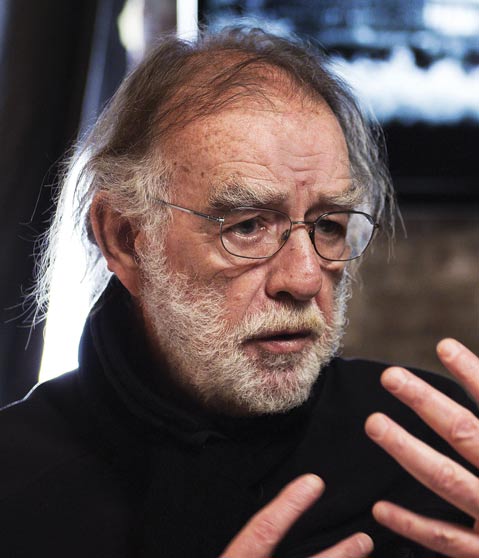Godfrey Reggio’s Qatsi Film Trio Gets a Coda
UCSB Arts & Lectures Brings Visitors to Santa Barbara
As you might imagine, the man who gave us the Qatsi trilogy understands that his movies aren’t for everybody. For the uninitiated, the three movies — Koyaanisqatsi, Powaqqatsi, and Naqoyqatsi — are enigmatic silent films, scored by Philip Glass, meant to convey a sense of humanity’s fallen state vis-à-vis the natural environment. “I usually hope that when people come to my films, they leave their expectations behind,” he laughed as we spoke by phone last week. He then swiftly segued into a disquisition on people who order hamburgers only to discover what they’re eating isn’t beef. Somehow, in the span of three films filled with gorgeous images of the horrendous consequences of incipient human technology on the planet, Godfrey Reggio has managed to keep a kind of cult alive — until now. Enter Reggio’s new film, Visitors. “The premiere in Toronto was a big success. That is to say, 100 percent of the people stayed in their seats, and they all stayed for the question-and-answer period, too,” he laughed. “The first film I made had 400 images, the second 500. The third 600. This new film has 74.”

Visitors, which UCSB’s Arts & Lectures will screen at the Arlington Theatre on Saturday, January 25, following a marathon showing of the three Qatsi films, probably is the visit to the hamburger stand where beef has been exchanged for something unexpected. “It’s the cat that barks,” as the seemingly inexhaustible metaphor-maker Reggio puts it. “All of my films are about technology finally,” he says, offering a semi-explanation, “but that’s the most misunderstood topic in the world.” Since we are immersed in it and it has already changed the nature of nature, it’s also changed us, he explained. “We have become cyborged. Not in the sense of science-fiction movies, but in a deeper sense; we’ve become less human.” How he will present this in a film that seems to consist mostly of images of human faces is the surprise that awaits the non-hamburger-seeking viewer, and Reggio doesn’t mind leaving that discovery ambiguous.
“Goethe said that the poetry that is the least accessible is the most efficacious,” said Reggio. His poetry is the cinema.
Reggio wasn’t always a filmmaker, but his role as social visionary began early. A former Catholic monk, he also spent a great deal of time working with gangs. “Not as a leader, but as an organizer,” he said. But film became his main method of connecting. In fact, Reggio claims, film is probably the only way to connect with the problems humans face today. “You can’t use language anymore,” he said, “because all language does is record the way the world used to be. Art, film, and music are the only possible ways to bridge gulfs. Film and music are meta-languages.” But even then, Reggio says, it’s too late (a surprising conclusion for someone many consider New Age in his sensibilities).
“There isn’t really any hope for humans,” he said. “The future is rooted in the present, and the present is too wrapped up in technologies.” Is it already all over, then? “That being said,” Reggio added, “I have hope in my relationships. I don’t believe I can change the world. Only a megalomaniac believes that.” But we can be good to each other, he thinks. “I am hopeful in my range of relationships,” he said.
Reggio won’t attend the screening at the Arlington, which takes place at the same time his film previews for general release in New York. “But I’m not worried about not being there,” he said. “My films are like children. They speak for themselves.”
4•1•1
UCSB Arts & Lectures presents Visitors at the Arlington Theatre on Saturday, January 25, at 8 p.m. Prior to the screening, the Arlington will show Reggio’s Koyaanisqatsi at 1 p.m.; Powaqqatsi at 3 p.m.; and Naqoyqatsi at 5 p.m. Call (805) 893-3535 or visit artsandlectures.sa.ucsb.edu for tickets and info.



